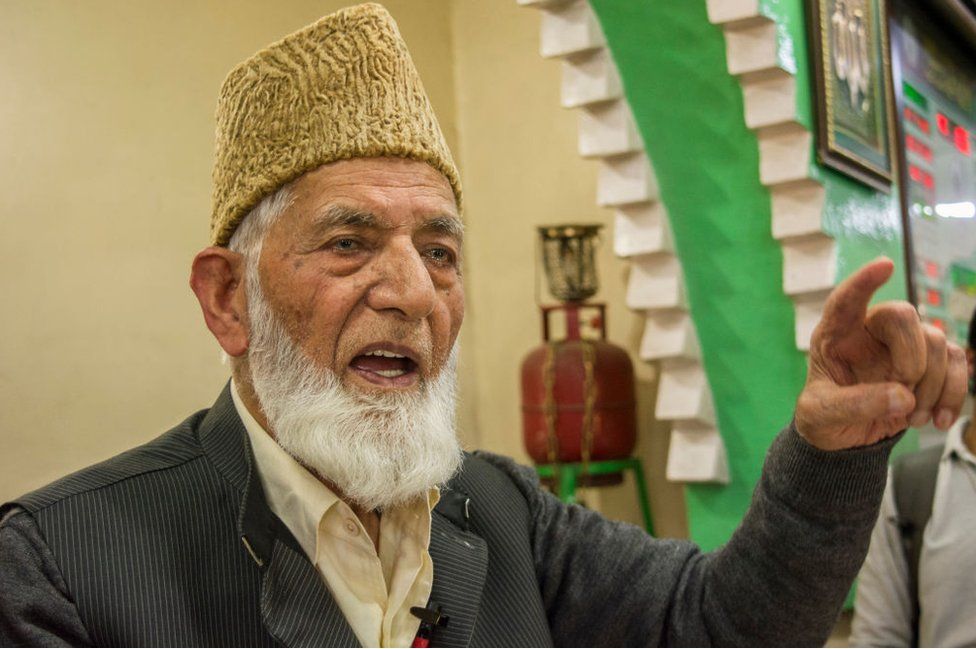
by Tayyaba Khan 31 August 2023
A symbol of integrity, unwavering determination, resistance, and vision throughout the history of the Kashmiri independence cause. Syed Ali Shah Geelani embodied the struggle and resistance of Kashmiris; he had unrivaled passion, ideology, and a unique perspective on Kashmir. Syed Ali Geelani was born on September 29, 1929, in Zoorimunz village, Sopore, Jammu and Kashmir, and grew up in an environment of political consciousness. His passion for fighting for the rights of his fellow Kashmiris was sparked by his early exposure to the political climate in the region. When Geelani joined the All India Students Federation (AISF) in college, his journey into activism officially began.
Later, he joined the Jammu and Kashmir National Conference but subsequently dropped out amid differences in the party’s stance on various issues. His departure signaled the start of his affiliation with Jamaat-e-Islami, a political and religious group that was essential in forming his ideology. Geelani rose to prominence over time among the various factions of the All Parties Hurriyat Conference (APHC), a confederation of Kashmiri separatist political and religious organizations. His participation in the APHC increased his stature and power as a separatist leader.
He not only articulated the Kashmiri cause with remarkable clarity, but he also brought his entire populace together in support of that cause—Kashmir’s liberation and the right of Kashmiris to self-determination—for which he paid a heavy price. He was adamant that a free and impartial plebiscite should give the people of Jammu and Kashmir the opportunity to determine their political future. He vigorously opposed Indian authority in the area throughout his life and demanded that the Kashmir issue receive worldwide attention.
The principle of the Kashmiri people’s right to self-determination was never compromised by Geelani Sahib. On September 2, 2021, the New York Times concurred, stating that Syed Ali Geelani was an unyielding leader in Kashmir.
In order to put an end to this dishonorable and tyrannical chapter of the occupation of Jammu and Kashmir, Geelani Sahib urged the conscientious Indian parliamentarians to start a debate in the parliament about the issue of unmarked graves, mass graves, and all types of crimes being committed against the people of Jammu and Kashmir.
Geelani Sahib predicted that 500,000 Biharia would receive Kashmiri citizenship during a news conference on October 26, 2009, he proved to be prescient. To alter Kashmir’s demographics, six to seven hundred thousand army personnel will receive citizenship. India will then say, “Okay, let’s hold a referendum right away.” That is precisely what is taking place right now in Kashmir.
He always fearlessly confronted Indian abuses. He was not allowed to use the internet or other communication tools. In 1981, Geelani’s passport was impounded. Despite having kidney cancer, he was prohibited from going abroad for treatment. He was not permitted to attend even an Urdu book sale at Kashmir University, let alone travel abroad. He endured both physical and psychological torture while detained in Indian prisons.
When he passed away, Indian forces snatched up his body and buried it somewhere desolate. Kashmiris saw his death as a custodial killing because of this. Geelani requested in his last will and testament that his remains be interred in the Srinagar Martyrs Graveyard. His final request is honored, even if he is hanged. However, in Ali Geelani’s case, the Indian soldiers lacked the decency to carry out his request. Geelani’s relatives said that the cops took away and forcibly buried his remains.
Several articles of the UDHR could be relevant to the situation in Kashmir. Article 3 states that everyone has the right to life, liberty, and security of person. Article 9 prohibits arbitrary arrest, detention, or exile. Article 19 protects the freedom of expression and opinion. But the so-called India, which calls itself the ambassador of peace, openly violates all the clauses of UDHR in Kashmir. Whether it is Syed Ali Geelani being imprisoned for 11 years I n his house, martyring a brave man like Burhan Wani, raping women, using plate guns on children or oppressing Malik Yasin, every step of India is in kashmir. Denies the Indian so-called false claims of ambassadors of peace in the world.
Syed Ali Shah Geelani’s commitment to the Kashmiri cause and his unshakable spirit in the face of adversity will continue to serve as an example for future generations as the world looks back on his journey. His battle exemplifies the Kashmiri people’s undying thirst for independence and justice, which is still a glimmer of hope. Throughout his life, Syed Ali Geelani faced immense hardships and persecution from the Indian government, which exposed their double standards to the world. His unwavering resilience in the face of adversity shed light on the urgent need to address the longstanding issues in Kashmir and ensure a just and peaceful resolution for its people.
